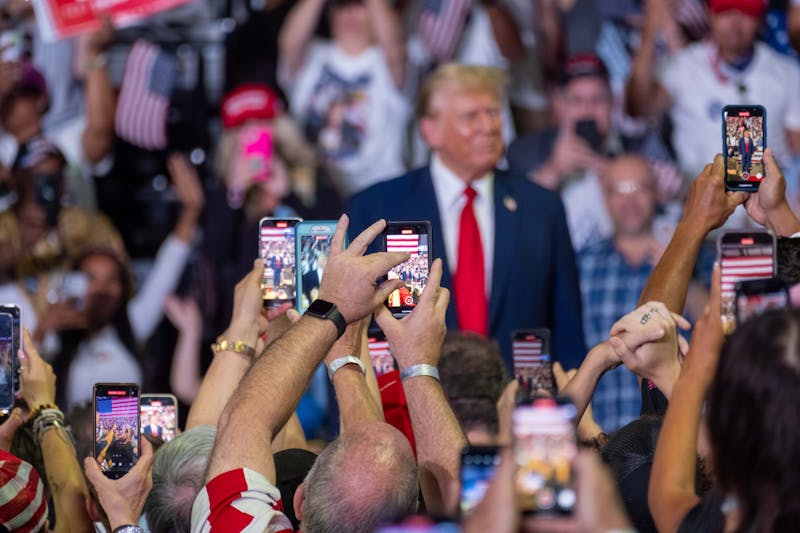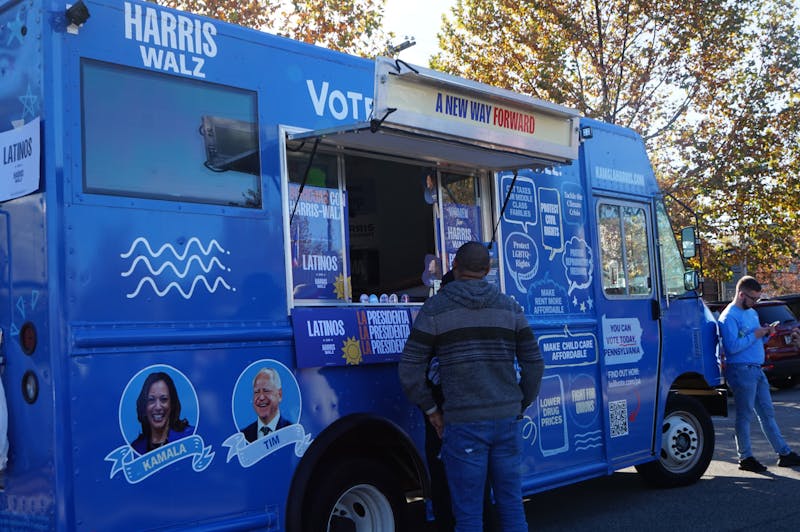
Amidst the munching and gossiping characteristic of Hill Dining Hall, a debate ensues in the booth closest to the omelet station. There, my friends and I are discussing a recent opinion column published in The Daily Pennsylvanian titled, “Stop calling Trump voters racist.” We go back and forth about the arguments laid out in the article as well as those in the DP’s Instagram comment section challenging it. I ultimately walked away from the debate with the conclusion that, yeah, we should stop calling Trump voters racist. It’s misguided and unproductive.
To be clear, you have the right to judge others based on their political beliefs and choices. After all, a political opinion can reveal a person’s values, objectives, and perception of the world. However, how you judge one’s politics and the framework guiding your judgment has undeniable consequences. Labeling those who voted for Donald Trump, by and large, as racist and sexist — or, as Hillary Clinton said in 2016, a “basket of deplorables” — oversimplifies and mischaracterizes the choice of millions (and now the majority) of voting Americans.
Equating a vote for Trump as proof of racism would mean that the 77 million Americans who cast their vote for him are racist, defined by Merriam-Webster to be someone “having, reflecting, or fostering the belief that race is a fundamental determinant of human traits … and that racial differences produce an inherent superiority of a particular race.” The most common reason I’ve found underlying this claim is the argument that A) Trump is racist, so B) those who vote for him must also be racist. For argument’s sake, regardless of whether Trump actually is or isn’t racist, let’s hold that A), Trump is racist, is true. Even if A) is true, it doesn’t certainly mean B), those who voted for him are racist, is also true.
I agree that some Trump supporters are explicitly racist, sexist, and emboldened by his rhetoric. However, the key word here is “some.” I don't believe that the majority of Americans have gotten more racist since voting for President Joe Biden in 2020. This becomes even more improbable when analyzing the 2024 presidential election’s results. Kamala Harris not only underperformed in rural and suburban areas but also in urban areas where Democrats have historically dominated — and needed — to win swing states. In fact, Harris got just 59% of voters in urban areas, lower than Biden, former President Barack Obama or Hillary Clinton. Additionally, even with the demographics she won — particularly women, Black men, and young voters — Harris won by a narrower margin than Clinton or Biden. Many Democratic voters also failed to turn out this year, with counties delivering the biggest Democratic victories in 2020 receiving 1.9 million fewer votes for Harris than they had for Biden. These losses in traditionally Democratic strongholds indicate that, ultimately, Trump won the 2024 presidential election because the majority of Americans didn’t believe Harris was the best candidate to promote their interests.
I’ve often heard — and used to espouse myself — a variation of the counterargument which is that those who voted for Trump were willing to overlook his racist and sexist tendencies, thus making Trump voters racist. However, these tendencies aren’t being overlooked; they are being weighed. As voters, we are constantly weighing the pros and cons of our candidates. You may not like X about Trump, but your preference for Y outweighs your distaste for X. For example, if you’re a voter whose top priority is maintaining global peace, and you feel failed by the Biden-Harris administration on the issue, why would it be rational for you to weigh Trump’s racist tendencies as more important than his isolationist stance that you deem critical to world peace? The fact is, most voters choose the candidate they perceive as prioritizing their interests.
Not only is labeling all Trump supporters racist or sexist a misguided oversimplification, but one that stifles productive dialogue and undermines efforts to foster meaningful change in our democracy. If you are going to retain anything from this article, let it be this: Accusatory messaging doesn’t persuade people to change their minds, which you need to do if you want your preferred party to win elections and enact change. When you attack a person’s identity by labeling them a racist, you disincentivize the very person you need to convince from questioning their beliefs. Such rhetoric backfires, incentivizing people to hold onto the beliefs you find problematic even tighter. This is especially true in today’s political climate, in which political opinions are becoming intrinsic to one’s identity.
Even if you consider someone to hold a racist belief or be weighing a candidate’s positions incorrectly, it’s more productive to explain how that belief may be racist than to condemn the person as a racist. Beliefs are malleable, identities less so. If you are committed to change, invite and debate people to it instead of shutting down. I understand that those who are directly affected by rhetoric and policies promoting racism, sexism, or xenophobia may be hesitant — and rightfully so — to engage with those they view as endorsing hate. I admit, it’s difficult. I find it difficult to discuss abortion rights with those who think reproductive choice belongs to the government, but I do it. I choose to, and you should too. Why? Because, fair or not, that’s how change happens in a democracy, by convincing people to change their minds through humanized discourse.
To be “one nation, indivisible,” we must have productive debate, especially with those whose beliefs we oppose. To achieve “liberty and justice for all,” however you define it, you must convince the average American it is worth their vote. Start a conversation with your peers from the other side of the political aisle. I recommend the booth next to the omelet station in Hill.
SOLEMEI SCAMARONI is a College first-year student studying politics, philosophy, and economics from Houston. Her email is solemei@sas.upenn.edu.
The Daily Pennsylvanian is an independent, student-run newspaper. Please consider making a donation to support the coverage that shapes the University. Your generosity ensures a future of strong journalism at Penn.
Donate












